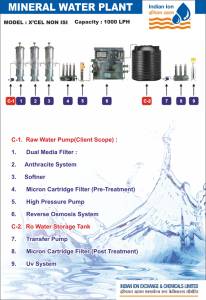
This document outlines a comprehensive proposal for a mineral water project that operates outside the ambit of the Indian Standards Institution (ISI) certification. While acknowledging the benefits of ISI certification, this proposal focuses on a viable alternative, emphasizing cost-effectiveness, agility, and market niche targeting.
I. Executive Summary:
This project aims to establish a profitable mineral water bottling and distribution operation focusing on a specific market segment, prioritizing affordability and accessibility without compromising quality. By foregoing ISI certification, we reduce initial investment costs and regulatory hurdles, allowing for quicker market entry and greater flexibility in responding to evolving consumer needs. This strategy is particularly suited to regions with less stringent regulatory oversight or specific consumer preferences that value affordability over formal certification.
II. Product Description:
Our mineral water will be sourced from a carefully selected, naturally occurring underground spring known for its purity and mineral content. Rigorous testing will be conducted by independent, accredited laboratories to ensure the water meets stringent safety and purity standards, even without the ISI mark. The testing protocols will adhere to international best practices and will be transparently communicated to customers.
The product will be offered in various packaging options to cater to different consumer needs and purchasing power:
We will emphasize a clear and concise label, highlighting the key selling points: source location, purity assurance (through independent lab testing results), and mineral content. The branding will focus on freshness, natural purity, and affordability.
III. Target Market:
Our target market will be price-sensitive consumers and businesses in [Specific Geographic Location or Demographic]. This may include lower-income households, smaller businesses, schools, and community events. This focused approach allows us to optimize marketing and distribution strategies for maximum impact.
IV. Production Process:
The production process will follow stringent hygiene and quality control protocols to maintain product integrity and safety. This includes:
V. Marketing & Sales Strategy:
Our marketing strategy will emphasize affordability, purity (supported by independent lab reports), and convenient accessibility. We will utilize a mix of strategies:
VI. Financial Projections:
[Insert detailed financial projections, including start-up costs, operating expenses, revenue forecasts, and profitability analysis.]
VII. Risk Assessment & Mitigation:
We acknowledge the risks associated with operating without ISI certification. These include potential challenges in securing larger contracts or entering certain markets. To mitigate these risks, we will:
VIII. Conclusion:
This mineral water project presents a compelling opportunity for establishing a profitable business by focusing on a defined market niche and streamlining operations by foregoing ISI certification. By emphasizing quality, affordability, and transparency, we can build a strong brand and capture a significant share of the target market. The detailed financial projections and risk mitigation strategies presented demonstrate the viability and potential for success of this venture.